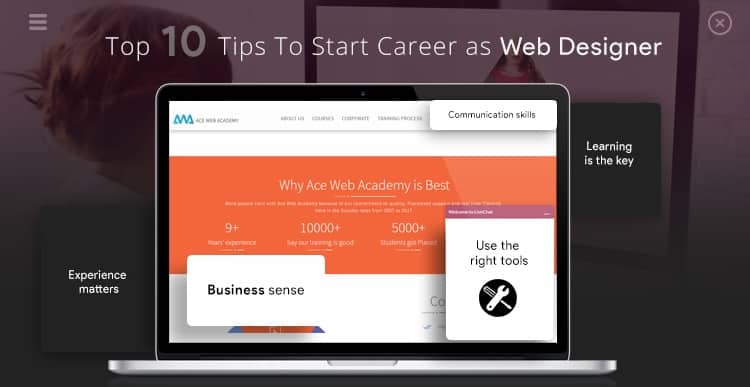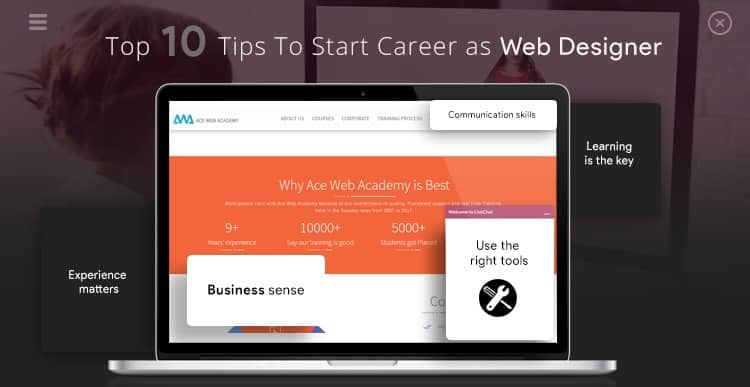Top 10 Tips To Start Career as Web Designer
Creating stunning websites that are not only visually appealing but also help a business achieve its goals. Does that sound interesting? Well, if it does you can very well think of a career in Web designing.

Websites are the lifeline of the Internet. As the Internet continues to rule the world and every company big or small wants to create an online presence, the demand for professional web designers is continually on the rise.
There is immense scope in this field and the career opportunities are tremendous.Advertising agencies, publishing houses, design studios, marketing firms and even educational institutions look for skilled and qualified web designers with a creative bent of mind.
But just being creative is not enough to be a successful web designer. You need to learn the basics. You need to learn how to deal with clients, how to manage your work and how to showcase your abilities. While some skills can be learnt, some develop only through experience. So before you embark on your journey to establish a career in web design read a few priceless tips here that will help you along the way.
1. Knowledge is Power
Creative mind and dedication is just one aspect of becoming a proficient web designer. You have to face numerous challenges to make a place for yourself in the design industry. And when you have several competitors trying to build a reputation,your skill set is what sets you apart from the rest.
At the very least you should be familiar with HTML, CSS, JavaScript and PHP. You need to be proficient in graphic design software like Photoshop, Flash and various Web layout tools like Dreamweaver.
Your knowledge in Graphic design, Interface design, Animation, SEO will enable you to create successful web pages and deliver an enhanced user experience. You can consider doing a degree or a certification course in web design to build a solid foundation of the theoretical knowledge. Once you know the basics it will be easy to gain the trust of potential clients. A formal education in this field also makes it easy to secure jobs in MNCs, marketing firms and advertising companies.

If you do not have a formal educational background in this field then you may start out as an assistant to gain some hands-on experience. Once you build an impressive portfolio of the websites you have designed, you can advance up your career and take more challenging projects.
2. Learning New Skills is the Key

Join online website design forums and become a member of different website design communities. You will find several professional designers who share their experiences. Read their blogs, seek inspiration from their work, learn from them; take advice and tips from them.
You can also get your queries answered in these forums. It is always good to be in touch with people in the same field so that you learn from their mistakes and successes.
3. Practice Makes a Man Perfect

Learning is one thing, but practically trying out everything that you learn is another. Unless you work hands on and try out new things you cannot dream of becoming a successful web designer. At times you will achieve success, and at times you will fail. But it is only practice and learning from mistakes that you will get to know the design techniques inside out.
4. Past Web Design Experience Matters

A good qualification will only help you start your career. After you land your first job, your experience is the most important factor that will take you high up the ladder. No. of years of experience and the no. of projects that you have carried out successfully is used as a yardstick to determine your calibre in this field. So work on as many design projects as you can to quickly gain some experience and establish your foothold in this field.
5. Update Your Skills, Keep Abreast With Latest Technology

A web designer should never stop learning. In the world of ever changing technology new products, new standards and new techniques emerge almost everyday. You need to learn new skills and update yourself with the latest design tools and concepts available to get ahead of the competition. If you do not keep pace with the latest web design trends you may lose your market share to your competitors.
6. Showcase Your WorkÂ

You need to have an impressive portfolio to win over the trust of your clients. If you want your clients to believe in your calibre and skill you need to show them solid evidence. Don’t expect your client to give in to your verbal promises. A portfolio of good work and testimonials from previous clients will help you showcase your abilities to march ahead of your competitors. Even if it means working for free on some projects it will be worth the effort as the experience gained during this process will bring good returns in your career ahead.
7. Adapt Great Communication Skills

A web designer needs to interact continuously with the client. Good communication skills will help in creating a good first impression. Be a good listener so that you can comprehend the customer’s requirements clearly. Use polite and friendly language to develop a personal equation with the client. Speak with confidence when you sell your skills and tell them about your design choices that you feel are right for their business.
8. Plan and Organize Your Work

Like any other profession you need to be well organized to attain success in the web designing profession. Prioritise and plan your work, maintain a to-do list for the day and organize your files and folders in the computer so that things do not go haywire while you work. Do a proper research of the client’s business. Understand his expectations and the goals he wishes to achieve through the website. Design a sketch of the website on the paper before you start off with the process. A little planning saves a lot of time and avoids rework later on.
9. Use the Right Design Tools

You need proper design tools to ensure that your hard work gives the best outcome. While some text editors and graphic design software are available for free, you can also pay a small price and buy the advanced versions of web design tools. Make sure you have everything that it takes to create visually appealing and stunning websites.
10. Use Intuitive Business Sense

The goal of most company websites is to help the business grow. Hence a little business sense will always help a web designer to do his job perfectly. This does not mean that you need an MBA degree to understand the marketing needs of the client.
You should basically have an idea of what goals a business wants to achieve through the website and how to use your design techniques to help it achieve them. If you provide a complete business solution than just a visually appealing page you will certainly win over your competitors.
Final Thought
So if you have a sense of creativity, start off with getting the basic knowledge and go on to create an impressive portfolio for yourself. Like any other profession, hard work and persistence is what it takes to establish yourself in the web design field.
Keep learning new technologies and softwares to keep yourself updated. If you follow these important things you can rapidly respond to the changing needs of the client.




